
- TURTLE BEACH MONTEGO DDL WINDOWS 7 DRIVERS
- TURTLE BEACH MONTEGO DDL WINDOWS 7 SOFTWARE
- TURTLE BEACH MONTEGO DDL WINDOWS 7 PC
- TURTLE BEACH MONTEGO DDL WINDOWS 7 PROFESSIONAL
Audioview is a useful little WAV editor, complete with basic effects, while Music Games provides three arcade‑style educational teasers - Musiquiz, Note Blaster, and Rhythm Master. Audiostation is the familiar rackmounting suite of mixer, MIDI player, WAV player, and CD player.

TURTLE BEACH MONTEGO DDL WINDOWS 7 SOFTWARE
The intriguingly named Vortex Control Panel is a standard item for all A3D soundcards, and provides various choices for the A3D Audio, MIDI for DOS games, Wavetable mode and effects, as well as various 3D demos.Ī variety of software is installed from the Montego Applications CD‑ROM. A further icon had appeared in the Control Panel for the Vortex Control Panel, which changes the many new hardware options now at your disposal. In the case of the Montego, I discovered a new icon on my Taskbar (the Voyetra System Tray) which launches a Turtle Beach mixer, as well as accessing eight other applications. Apart from a huge number of new files and folders, you also tend to find things in unexpected places. Looking round your hard drive after any consumer soundcard has finished its installation can be an eye‑opener.
TURTLE BEACH MONTEGO DDL WINDOWS 7 PC
This first checks your PC for the existence of DirectX 5.0 or later, and then installs all the supplied applications.
TURTLE BEACH MONTEGO DDL WINDOWS 7 DRIVERS
On the second re‑boot, it installed joystick drivers and the Soundblaster emulation, and then launched automatically into the setup.exe file on the CD‑ROM. Having installed the new drivers, Windows 95 wanted to restart again. Drivers are also provided for Windows 3.1 and NT 4.0. Windows 95 discovered the new hardware, and asked for the drivers, which are to be found on the Montego Applications CD‑ROM. There are no jumpers to set: you simply plug it in and re‑boot. Thankfully the card markings are correct. These are incorrectly labelled in the manual, which caused some head‑scratching when I first tried to record. On the backplate is a 15‑way 'D'‑type joystick/MIDI socket which provides an MPU401 compatible 1‑in/1‑out MIDI interface, and three 3.5mm jack sockets for mono mic in, stereo line in, and stereo line out. The planned add‑on board (priced at around £80) provides both digital in and out, although details of its release date are a bit hazy at the moment. The final connector on the card is labelled S/PDIF interface. There is also a standard Waveblaster daughterboard connector, and three more connectors for attaching the audio output from a CD‑ROM drive (lead supplied), modem audio, and auxiliary (for anything else left over). The circuit board features the Aureal Semiconductor AU8820 single chip PCI audio accelerator, and although there are other, cheaper soundcards that use it, Turtle Beach have also included the SigmaTel STAC9701T chip, which provides high‑quality 18‑bit converters. In common with most other PCI soundcards, the Montego is petite (scarcely five inches long), and no‑one should have any problems installing it. Included in the bundle is MIDI Orchestrator Plus, a comprehensive MIDI sequencing package which includes piano roll, notation, event list, and even SysEx editing. However, contrary to some rumours, this form of audio acceleration will not help people running DirectX plug‑in effects. This applies to any application that comes with DirectX 5.0, such as Sonic Foundry's Acid (see review starting on page 176). If an application uses multitrack audio, and would normally carry out the mixing using DirectSound, then CPU overhead with the Montego installed should be significantly lower.

Because of this extra hardware, the Montego can offer full‑duplex recording (for simultaneous recording and playback) with independent sample rates. There are 16 hardware‑based sample‑rate converters for processing multiple streams of audio, along with 16 hardware digital mixers. This last aspect is intriguing, and derives from the fact that there is extra hardware on the card that bypasses the normal DirectSound drivers of DirectX 5.0, thus lowering CPU overhead. In the light of this specification, £120 seems a small price to pay, especially as the Montego is a PCI card which also claims to be an Audio Accelerator. Their new Montego A3D Xstream has 64‑voice wavetable synthesis (using 4Mb of your system RAM), 18‑bit converters, Aureal 3D positional sound, DOS game compatibility, a Waveblaster‑compatible daughterboard socket, and (at some point in the future) an optional S/PDIF interface. Turtle Beach have been producing high‑quality soundcards for years.
TURTLE BEACH MONTEGO DDL WINDOWS 7 PROFESSIONAL
If you like playing the odd game, but still want quality audio when writing music, Martin Walker believes the Turtle Beach Montego could provide the best of both worlds.ĭespite the large number of professional soundcards appearing over the last year, there is still great demand for good, audio‑quality cards that remain compatible with DOS‑based games, and which don't break the bank.


 0 kommentar(er)
0 kommentar(er)
